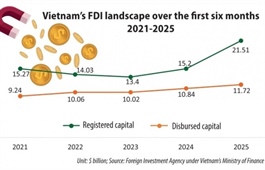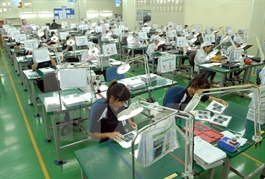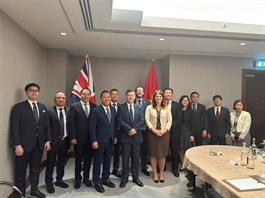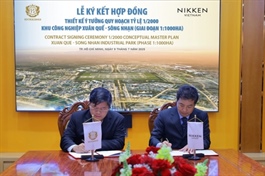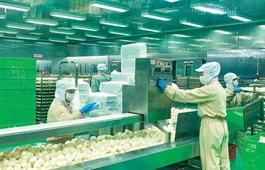PPP rules to power Vietnam’s innovation
PPP rules to power Vietnam’s innovation
Unprecedented regulations on public-private partnerships in the science and technology sector are expected to accelerate innovation and digital transformation across Vietnam’s business community.
Hiep Nguyen, COO of tech startup AI Hay, is steering his company towards ventures he hopes will benefit from the incentives outlined in Decree No.180/2025/ND-CP, which took effect on July 1. The decree sets out the government’s policies for public-private partnerships (PPPs) in science and technology.
“Decree 180 is a very important step forward, creating great opportunities for private enterprises, especially technology enterprises and innovative startups,” he told VIR. “The decree opens up a clear mechanism for enterprises to access state resources, including capital from the budget and data.
Operating since 2022, the company is currently developing digital platforms that bring AI into learning and teaching. For AI enterprises like AI Hay, the decree is deemed a valuable resource for its ambitions, with difficulties in data standardisation being a sticking point in recent times.
“The state’s willingness to order research and accept risks with high-tech projects also helps businesses boldly innovate, instead of only investing in sure-fire projects. If private enterprises know how to grasp and connect with institutes and schools, this decree will not only open up growth opportunities but also contribute to enhancing the innovation ecosystem in Vietnam,” he added.
The decree is receiving widespread support from the private sector, as its provisions are expected to enable more firms to enter and expand in the field.
Chan Cong Hoa, chairman of medical tech manufacturer MaiHoa Group said, “MaiHoa has reviewed its entire development strategy and launched a plan to reform our collaboration model with the public sector, aiming to become more proactive, creative, and inclusive now that Decree 180 has come into effect.”
He explained that the company will initially focus on three core areas. Firstly, it plans to propose social PPP models that apply nano air-purification technologies and the VNSanitizer water solution to the environmental, energy, and healthcare sectors, especially through services in large urban centres such as hospitals, schools, public transport, and community facilities.
Secondly, MaiHoa will increase spending on digital platforms to digitise QR code–based information retrieval, serving as an effective bridge for digital education through its eco-friendly product systems. These solutions will promote transparency and compatibility with Vietnam’s national digital data infrastructure.
Thirdly, the company intends to develop joint programmes with research institutes, universities, and government agencies to boost domestic research and development capacity and keep pace with global trends in advanced technologies.
“We believe that, with clear direction from the government and the enabling legal framework under Decree 180, MaiHoa will not only grow economically, but also contribute meaningfully to Vietnam’s pursuit of a green, digital, innovative, and human-centred economy,” Hoa said.
According to the Institute of Management & Financial Studies, a key highlight of Decree 180 is its provision of a transparent, flexible, and secure legal foundation for PPPs in technology. Businesses will be able to access state resources including funding, land, and tax incentives, while gaining the authority to propose, implement, and retain the results of scientific and innovation activities, with risk-sharing mechanisms clearly defined.
“This decree demonstrates a forward-looking reform mindset, placing enterprises at the heart of the innovation ecosystem and accelerating collaboration between the public and private sectors to address major national challenges,” said Dr. Nam Ho, director of the institute. “I believe this is a prime opportunity for Vietnamese firms to establish themselves as strategic partners in shaping a digital and sustainable future.”
As outlined in the decree, PPP models will apply to high-tech fields, strategic technologies, and infrastructure supporting research, development, and the application of advanced and digital systems in alignment with the country’s economic and governance goals.
The model will also support training for digital workforce development. Participating organisations and individuals will benefit from exemptions and reductions in land use fees and rents, as well as investment incentives in accordance with land, investment, and other related legislation.
They will also be entitled to own the results of their scientific, technological, and innovative activities under prevailing laws, and may adopt risk-tolerant approaches within such activities.
The government is authorised to place orders and appoint contractors to deliver products and outputs resulting from PPP activities in line with sector-specific legal provisions.
Significantly, the decree offers extensive state support, including the allocation of up to 70 per cent of total capital for PPP projects to cover construction and site clearance costs. Additional financial support from the state budget may be provided, independently of its capital participation in PPPs, along with revenue risk-sharing mechanisms and other incentives.
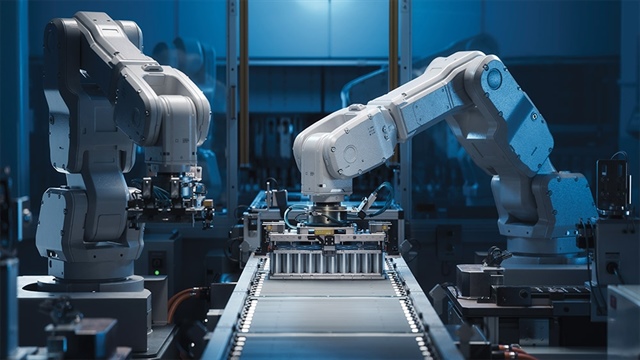
PPP rules to power Vietnam’s innovation, Photo: Shutterstock |
Le Xuan Dinh, deputy Minister of Science and Technology
In order to realise the Party’s goals in the Resolution of the 13th National Congress, developing Vietnam into a developed, high-income country by 2045, the Politburo has issued a series of resolutions on the socioeconomic development of the country, in which it is clearly identified science, technology, innovation, and digital transformation are key factors, the main driving force for the sustainable development of a country.
To quickly put the resolution into practice, the National Assembly and the government have issued specific action programmes, focusing on many areas, including digital transformation, innovation, and improving sci-tech capacity.
Implementing the Party’s direction and the government’s assignment, in about four months after the Ministry of Science and Technology (MoST) and the Ministry of Information and Communications were merged in March, the MoST submitted to the legislature for approval of five fundamental laws, creating an important legal corridor to guide the development of sci-tech, innovation, and digital transformation in the new development period of the country.
The revision and supplementation of recently passed laws not only aims to update the current trends, but also remove institutional bottlenecks that have long been considered major barriers in development.
The Law on Science, Technology, and Innovation also shows the vision and aspiration to turn Vietnam into a powerful nation.
For the first time, innovation is placed on par with science and technology, demonstrating a fundamental change in development thinking.
Meanwhile, the Law on Digital Technology Industry comprehensively regulates digital technology, semiconductors, AI, and digital asset industries, with preferential policies for key projects in these fields.
The amended Law on Product and Goods Quality and the amended Law on Technical Standards and Regulations mark a comprehensive innovation in thinking and management methods in standards, measurements, and quality, fundamentally transforming from administrative management to risk management, and from pre-inspection to post-inspection based on data and technology and others.
The amended Law on Atomic Energy also creates a comprehensive legal framework, consistent with the guidelines of the International Atomic Energy Agency. The law identifies nuclear power as a national strategy, contributing to ensuring energy security and reducing carbon emissions.
Pham Thy Hung, deputy director Public Procurement Department Ministry of Finance
Decree 180 is an important legal document, which for the first time clearly and fully affirms the role of the PPP model in technology and innovation, the field with unique characteristics, high risks but potential for breakthrough development.
The decree expands the scope of PPPs not only limited to traditional forms such as build-operate-transfer, build-transfer-operate, operations and maintenance and others according to the law on PPP investment, but also includes joint ventures and associations according to the Law on Management and Use of Public Assets and new forms of cooperation such as funding, state orders, three-party cooperation.
One of the major lessons in PPP policy development is to clearly define the roles and responsibilities of the three participating parties: the state, research institutions, and enterprises.
On the state side, the first important task is to identify goals and directions for technology development and digital transformation according to the national strategy. The second is to announce urgent practical requirements for research institutes, universities and businesses to jointly solve. And the third is to provide basic infrastructure such as laboratories, research centres, and support funds.
For sci-tech organisations, especially universities and research institutes, they need to organise research activities, train high-quality people, while solving problems related to orders from ministries, sectors, localities, and enterprises.
A typical example is that the Hanoi University of Science and Technology cooperates with domestic corporations to build laboratories, research technological solutions and provide authentication services.
For businesses, the key role is to invest, operate infrastructure, commercialise research results and be responsible for bringing products to market to apply new technologies and bring innovations into economic life.
Thanks to the new legal corridor, many large projects in innovation will be accelerated in the coming time. Some examples that are being planned include the innovation centre in Hanoi, the national digital technology ecosystem, a big data infrastructure platform shared between the state and enterprises, and others.
- 10:27 16/07/2025



